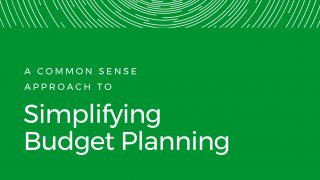- September 20, 2019
- CINC Systems

When you manage a homeowner association (HOA), you have many important responsibilities. Your clients depend on you to create a thriving, successful community for every resident living in the association neighborhood. As part of the logistical support you provide, financial knowledge plays a key role. Accounting knowledge is very useful when managing HOAs.
Although you don’t need to be a CPA to be a successful HOA manager, understanding accounting concepts will help you do your job more efficiently. You’ll be able to assist your HOA clients with day-to-day accounting tasks as well as big-picture projects, such as audits and budgeting. Association managers also help their clients by collecting resident fees, monitoring transactions, and assisting with annual audits and tax filing.
Using online accounting software for association management, such as CINC Systems, will help with all aspects of financial management for your clients. HOA accounting software automates many processes that formerly needed to be completed by hand. However, even with great software, it still helps to understand how accounting is useful when managing HOAs.
Let’s review some of the accounting basics you’ll need to understand to be a successful HOA manager.
Income and Expense Ledger and General Ledger
First, let’s look at the income and expense ledger. This is a vital financial statement for any organization, especially an HOA. Income and expense ledgers track the association’s monthly financial statements. It shows how much money the HOA receives each month and how much it spends. This data can then be compared with the association’s budget to see how well the HOA is staying on track with its financial projections.
The general ledger functions similarly but focuses on smaller individual transactions. Essentially, the HOA’s general ledger shows each unique withdrawal and deposit from the association’s various accounts. General ledgers provide much greater detail than income and expense ledgers. Together, the two ledgers are a valuable tool for understanding the association’s current financial state.
With online HOA accounting software, both types of ledgers can be fully automated. Use your HOA accounting software to sync your clients’ bank accounts to your software dashboard. This allows you to monitor all ledger transactions live, in real-time, from one convenient place rather than multiple websites or bank statements.
Check Register
The next accounting principle to understand for HOA management is the check register. Also known as a cash distribution statement, the check register tracks all paper checks written. Typically, the check register includes a detailed entry for each check.
Checks are numbered, and then a meticulous record is kept for everyone. This record includes the name of the check’s recipient, the amount, the invoice date, and the reason the check was written. It may also include a unique invoicing code or other tracking information determined by the HOA.
Using a check register helps you reconcile the association’s accounts payable and accounts receivable. It also helps you monitor your clients’ accounts for potential fraud. Unfortunately, HOA fraud such as embezzling is somewhat common. By keeping a watchful eye on the check register, you can catch any financial discrepancies and report them to your clients right away.
Accounts Payable and Receivable
Accounts payable and accounts receivable are another core concept that’s useful for HOA management accounting. Like the ledgers and check register mentioned above, accounts payable and accounts receivable are important parts of any association’s finances.
What is the difference between accounts payable and accounts receivable? Accounts payable refers to any money the association owes, such as outstanding bills or invoices from contractors. Accounts receivable cover the money that is owed to the association.
Together, both types of accounts are crucial for HOA bookkeeping. Using your HOA accounting software to balance the books, you can process accounts payable and accounts receivable for your clients and ensure their association stays on budget.
Collecting Resident Fees
When it comes to income for an HOA, resident fees are the major sources of revenue. Resident fees cover maintenance and repairs, upgrades, services like landscaping, and community amenities such as common recreational areas. Resident fees are also used to fill the association’s reserve account, which is like a long-term savings funding for big projects or emergencies.
As an HOA manager, you’re responsible for collecting resident fees and processing them. This can be done with the aid of your association management accounting software. Create an online payment portal, then instruct residents to submit their payments online via credit card or e-check. You can also generate a list of delinquent residents to see who hasn’t paid yet.
Preventing Financial Fraud
Accounting is also very useful for preventing financial fraud within your clients’ HOA. Unfortunately, associations are considered an easy target for many types of fraud because of the way they’re structured. With multiple individuals having access to the association’s accounts, an unscrupulous board member can embezzle funds from the HOA reserve or write bogus checks.
Unchecked, this activity can be ongoing and cause substantial damage to the association. With accounting knowledge, you can learn how to spot suspicious transactions right away. This is very important for managing HOAs. Your clients are counting on you to help protect their association from fraud.
Annual Audits and Budgeting
No discussion about accounting is complete without mentioning audits and budgets. An audit is a detailed, thorough review and analysis of an organization’s finances. It covers income, expenditures, and more. Many HOAs perform audits each year to check the pulse of their finances. When you help your clients conduct their annual audit, you can see how well the HOA stayed on track with its projected budget.
Did the association go over-budget? Was it under budget? After the audit, you can assist your clients with the creation of a new budget for the next fiscal year. Creating a budget will be informed by your accounting knowledge, including your awareness of the association’s current bookkeeping.
With software like CINC Systems, you can also help your clients prepare a budget by sharing financial reports via email. To try this convenient feature, call (855) 943-8246 to request a free CINC Systems demo.
Related Reads

Blog
Keeping Calm and Carrying On: Leadership Tips for Turbulent Times
- November 20, 2024

Blog
AI at Bat: What Umpires, Baseball, and Data Security Can Teach Us About AI Risks
- October 28, 2024

Blog
Do I really need a homeowner app when I have a mobile-friendly website?
- October 14, 2024

Blog
Weathering the Storm: How to Adapt to Soaring HOA Insurance Costs
- October 1, 2024

Blog
How Today’s Generative AI Investment Drives Long-Term CAM Success: A Timeline
- September 16, 2024

Blog
A Common Sense Approach to Simplifying Budget Planning Get ready to conquer HOA budget season with this effective strategy
- September 2, 2024
